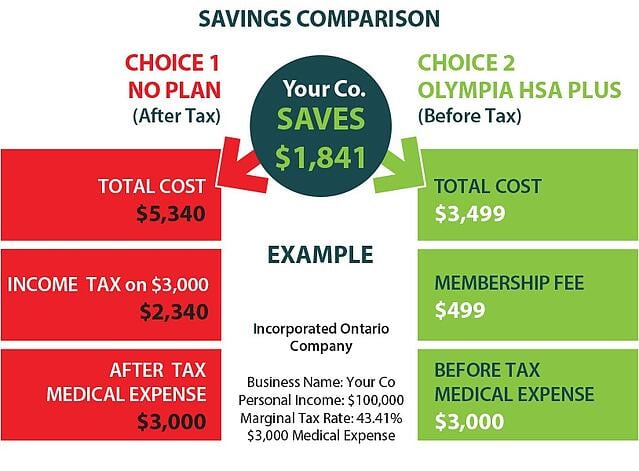Canadian small business owners are the focus of this article on a Health Spending Account and taxes.
Here's what you need to know about leveraging a Health Spending Account (HSA) to lower your taxes.
What is a Health Spending Account?
An HSA or Private Health Services Plan is an alternative to tradtional health insurance for small business owners in Canada. Along with being a more affordable option with a wider range of eligible expenses, an HSA is a tool for lowering taxes.
How does a Health Spending Account lower taxes?
According to CRA, "Contributions made by an employer to or under a private health services plan on behalf of an employee are excluded from the employee's income". At the same time, the contributions are an eligible deduction for the employer.
In essence, an HSA is a contract between an employer (a corporation) and an employee (the business owner). The contract stipulates that the corporation will reimburse the employee for out of pocket medical expenses. The reimbursement to the employee is tax free and the corporation can deduct the cost of the reimbursement.
The tax savings occur since the medical expenses are paid for through the business as opposed to personally. Instead of paying for personal medical expenses out of pocket with after tax dollars, a small business owner can use an HSA to pay for their expenses through their business with before tax dollars.
An example of tax savings
As a small business owner (let's say an engineer) with a corporation, there are essentially two options for paying medical expenses.
Choice 1 – you have no insurance plan and pay for your medical expenses out of pocket.
Choice 2 – you pay for your medical expenses through your corporation with an HSA.
Below is an example of the tax savings comparison between these two choices.

Choice 1 – Out of Pocket: After Tax Medical Expense
The medical expense is paid for by you, personally, with out of pocket after tax dollars. After tax dollar is the amount remaining after personal income tax is paid. In this example’s tax bracket, the company will distribute $7,120 (before tax), with 43% reserved to pay income tax ($3,120).
To explain in detail, each $1 you spend on medical expenses requires your company to pay you approximately $1.78 before tax. 43% (or 78 cents) is paid in tax to Canada Revenue Agency in the form of provincial and federal taxes.
Choice 2 – HSA: Before Tax Medical Expense
In this case, the medical expense is paid through your corporation as a before tax business expense. Effectively, you are able to write off 100% of your medical expense through your corporation. Value is created by keeping the additional 43% tax inside your corporation.
The cost of the HSA will vary by provider. In this example the yearly (total) cost of the HSA is $499.
Want to see how much your small business can save by using an HSA? Try using this HSA savings calculator.
HSAs have been widely adopted by Canada’s small business community as a viable alternative to traditional health insurance. Get our free Beginner's Guide on Health Spending Accounts and discover how it will save you and your business money while providing outstanding coverage.
No set up fees. No administration fees. No premiums.
